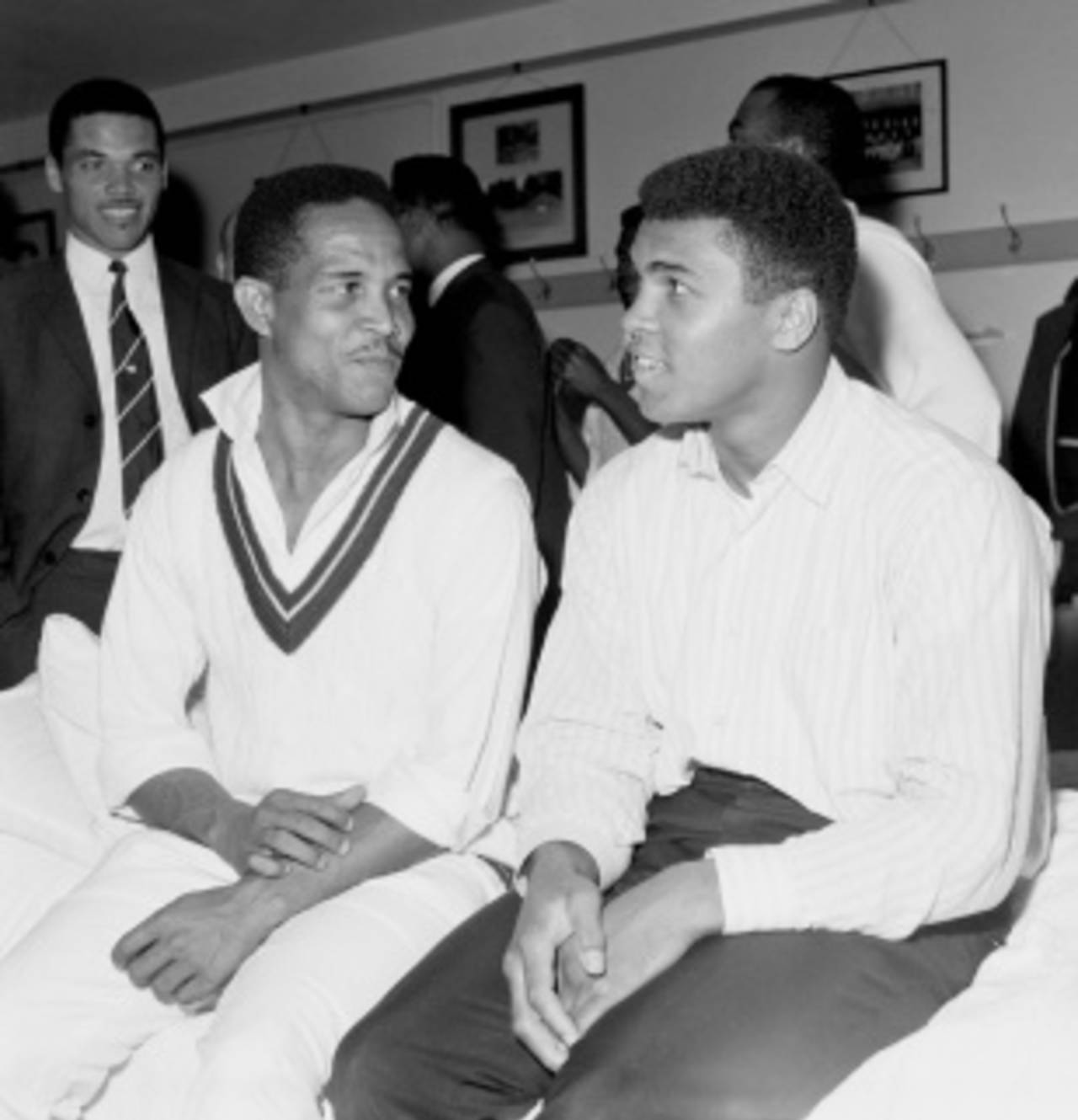Packing a punch
Cricketers who weren't afraid of hooking or cutting - in a boxing ring

Garry Sobers with Muhammad Ali at Lord's 1966 • PA Photos
Flintoff's recent conversion from England cricket talisman to heavyweight boxer was much picked over in the newspapers. He certainly can't be accused of taking it easy in retirement, having lost a lot of weight for his recent professional debut, in which he beat an American veteran of two fights on points. His opponent was named Richard Dawson - but wasn't the offspinner who played a few Tests with Flintoff in the early 2000s. Still, there are many hoping that Flintoff now retires with a 100% ring record.
Even Flintoff won't match the boxing feats of a former Test captain, John Douglas. Before he captained on the 1911-12 and 1920-21 Ashes tours Down Under, Douglas won the middleweight gold medal at the 1908 London Olympics. Suggestions that his father refereed the final seem to be wide of the mark, although he was a senior official at the Games. In cricket, Douglas's dour batting (and his initials JWHT) earned him a nickname that presumably didn't apply in the boxing ring: "Johnny Won't Hit Today".
Another England captain (if only in one-day games), and a convert to a ring of a different sort: Hollioake's busy post-cricket career, back in his native Australia, now includes professional encounters in the newish - and occasionally savage - sport of cage-fighting (also known as mixed martial arts or MMA). "I've pretty much boxed since I was 12," Hollioake said. "I wanted to be a professional boxer back when I was playing cricket, but Mum and Dad wouldn't let me."
The Auckland fast bowler Cleverley had a Test career that lasted more than 14 years... one match in 1932 and another early in 1946. Unfortunately he didn't take a wicket in either game. But he was a national amateur boxing champion in New Zealand, and set up his own gym.
The seemingly ageless Somerset allrounder Alley - the last man to score 3000 runs in an English season, which he did aged 42 in 1961 - was an earthy Aussie whose crooked nose attested to an early career as a boxer. He had 28 fights and won all of them. "There was even talk that I was close to a shot at the world welterweight title," he wrote in his autobiography, "but I can assure you I was a very long way from any such thing." His boxing career was, ironically, ended by a cricket accident - in the nets one day he was smashed in the jaw, and needed extensive surgery.
The big allrounder "Yogi" Ferreira, who came from Northern Transvaal to spend several seasons as a popular import at Edgbaston, was a successful heavyweight boxer in his youth. He won the Northern Transvaal amateur championship - and then tried for the full Transvaal title, and lost his unbeaten record to Gerrie Coetzee... a man who later won a version of the world heavyweight title.
The combative Australian batsman had a black belt in martial arts, and remains a boxing enthusiast. He might not have got into the ring himself, but his grandfather Harold did. "I think a fighter's instinct is passed on to you," said Langer. "My dad played Aussie Rules and my grandfather was an amateur boxer. I think toughness is instilled."
Wessels played Tests for Australia and South Africa, after earlier being a fine tennis player - he was once the top-ranked Under-16 in South Africa, and beat Johan Kriek, a future Australian Open champion. Later he took up archery, with a view to making the Olympics, although his cricket coaching commitments got in the way of that. And he also fitted in a fair bit of boxing, which came in useful during dressing-room disagreements: "A group of us would go to my father's gym," remembered his then team-mate Yogi Ferreira (see above). "We would work out, maybe spar a bit. It was all quite light-hearted but Kepler loved it. "
West Indies' captain on their tour of England in 1939, Grant - who followed his brother Jackie into the top job - had earlier been the heavyweight boxing champion of their native Trinidad. He was also a goalkeeper good enough to play for England's amateur side while at Cambridge University.

O'Brien, a small left-hand batsman from Victoria, might have been a fringe player in the 1932-33 Bodyline series - he made his debut in the second Test, and also played in the final one - but actually he was in on the birth of the controversial tactic: playing for an Australian XI against MCC early in the tour, he noticed several fielders crossing to the leg side for Bill Woodfull, and helpfully called out: "It's the right-hander down that end. I'm the left-hander." As David Frith's Bodyline Autopsy records: "The Englishmen smiled but did not reply." O'Brien was also a handy amateur boxer, who won his first 29 fights as a lightweight... then lost his 30th and last one.
Cheating a bit, I know, but Muhammad Ali spent some time with the 1966 West Indians, including a visit to the dressing room at Lord's, while preparing for a world title fight in London (he had two that year, against Henry Cooper in May and Brian London in August). The obligatory photos of Ali swinging a bat predictably emerged later, although I prefer a shot of him and Garry Sobers having a chat - "The Greatest" with the greatest allrounder.
Steven Lynch is the editor of the Wisden Guide to International Cricket 2013